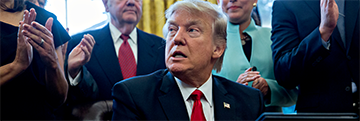America’s jobless rate has hit the highest numbers since the Great Depression, but the latest Economist/YouGov Poll indicates that most (57%) believe that there are even more people unemployed than the government’s 14.7% jobless rate suggests.
The April rate, in fact, does not take into account job losses that occurred in the last two weeks of the month.
Nearly four in five Americans see the jobless rate rising each month (78% say this about the unemployment rate since April). A majority of Americans (85%) put “all” or “most” of the blame for the nation’s job losses on the coronavirus outbreak. Just one-third attribute “all” or “most” of the blame to President Donald Trump and his administration. About one in five Republicans (17%) believe Trump deserves most of the blame.
Economic worries impact how people view the next steps in reopening the country. Nearly three in five (59%) see the country’s economy as getting worse, with jobs and the economy a particular concern for Republicans, who call it the country’s most important issue, and this week, for the first time, a majority (51%) of them believe the country is now in recession.
Still, Republicans continue to take a more optimistic view of where the country stands in relation to the pandemic’s impact. This week, even though they are nearly as likely as Democrats to know of coronavirus cases in their communities, they are much less likely to be concerned both about an epidemic in their own communities or in the country as a whole.
Republicans are also willing to move ahead with easing restrictions.
A majority of Republicans would rather the government focus on protecting Americans from the economic effects (56%) of the pandemic, rather than the health effects (44%). In contrast, two-thirds of Americans overall want the government to focus on the health effects (66%), rather than the economic effects (34%) of coronavirus.
More than two in five of those who say the economy should be the priority believe the worst of the pandemic has passed. That belief is contrary to this week’s testimony by the country’s leading health care officials. However, half of those who want the government to focus on the health impact think the worst of the crisis is yet to come.
A third of Republicans say Americans are overreacting to the dangers posed by the coronavirus. One in four believes that the virus poses no risk at all to them personally. So, ending some of the limits imposed by the government is something many Republicans believe is not only possible but appropriate:
- A majority (56%) of Republicans believe it will be safe to end social distancing by June 1. Just 17% of Democrats agree.
- One in four Republicans (compared to 1% of Democrats) say it is safe to end social distancing now—even though three-quarters believe social distancing has been at least somewhat effective in limiting COVID-19’s spread.
- By 50% to 40%, Republicans approve of protests against stay-at-home orders. That is an increase in support for the protests among Republicans from last week.
- More Republicans this week than before now characterize stay-at-home orders as an infringement on Constitutional rights. About two in five (42%) believe that today, up seven points in the last week.
- Republicans are also less likely to think the stay-at-home orders have been effective. That share dropped 12 points this week (from 43% last week to 33% today). More than half the public overall believes stay-at-home orders are effective.
- Republicans are far more willing than the public as a whole to re-open. Most Republicans would reopen schools and churches, something a majority of the public overall do not think should take place now.
There is a dark side to reopening that most Americans—regardless of their party—see. Nearly nine in ten Democrats and nearly two-thirds of Republicans believe that reopening is likely to result in more COVID-19 cases.
See the toplines and crosstabs from this week’s Economist/YouGov Poll
Image: Getty












